Music Reviews
GIVE PEAS A CHANCE - Serpentine Community Farm

As we nestled between the onions and the cabbages of the Serpentine community farm, we listened to Will Hawthorne play a delightful set that opened with the Kinks "Sunny Afternoon" and finished up with Louis Armstrong's "It's a wonderful world". The afternoon was dry although it wasn't particularly sunny but it is certainly a wonderful world for the community farm this week. In her introduction Madeline Hall informed the audience that the notice to quit has been withdrawn. The Serpentine Community Farm can continue and the site is no longer going to be used for executive housing. She told us that the committee has been given a seventeen month window to negotiate a proper future for the farm. Madeline had planned the event to mark the end of the farm but was thrilled that the event could be used to celebrate its continuation instead.
Will had pulled together a set list to celebrate gardening and the environment and the audience joined in with the mostly well known songs in the set including the Village Green Preservation Society; Norwegian Wood; Born Free; The Bare Necessities; I Wanna Be Like You; Big Yellow Taxi; The Times They Are A Changing; Maggie's Farm (a person at my table suggested that it should have been Maddie's Farm); Give "Peas" A Chance; Why Does It Always Rain On Me; and Bad Moon Rising. Will was joined by another musician at one point for Captain Beefheart's Plastic Factory.
During Will's intermission, Madeline and friends performed a folk song called Diggers by Leon Rossellon. According to Wikipedia "the Diggers were a group of Protestant radicals who attempted to farm on common land in England. They are sometimes seen as forerunners of modern anarchism." Is Buxton ready for this? It looks like it had better get ready.
You can find out more about the farm at https://www.facebook.com/serpentineprojectbuxton/ and https://www.serpentinecommunityfarm.org/.
Alex Watts
A LA FRANCAISE - City of Manchester Opera
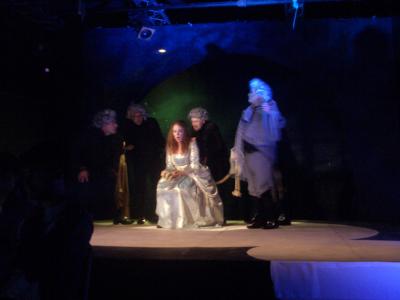
It’s bad enough that the French won the World Cup, but to have a whole programme of French Opera and French Song is sort of mean! Well, NO, it’s quite special with all the great melodies and tunes. When you have Gounod, Saint-Saens, Lalo, Delibes, and Offenbach to choose from what else could you possibly need? Bizet of course – and this we had in spades.
Manchester Opera are fortunate to have some special soloists, a hard working conductor in Juan Ortuno, and a phenominal accompanist in Jonathan Ellis. When this stunning pianist decides to play sympathetically as he did this afternoon then he is truly special!
So many great solos, too many names to mention, and a chorus sound to rival the Royal Opera House, the audience couldn’t fail to be knocked out – and we were. Sadly this concert was too late in the Fringe to be considered for an award, but if it was in my power they would all get one.
Well done!
Andrew Hodkinson
THE SOVEREIGN SAXOPHONE OCTET IN CONCERT - The Sovereign Saxophone Octet
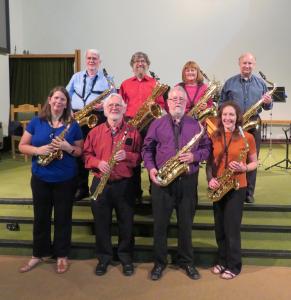
I have to confess that for many years I really didn’t like the saxophone! But this group converted me when they first came to the Fringe and I have been a fan ever since.
Tonight was no different! A great programme of different styles and periods of music from Gabrieli to 20th century original music. I have no doubt that if Gabrieli has heard the sax he would have used them.
Along the way we had Mozart and Delius with Blues and Rags and some “Jazz” classics. All delivered with love and wonder, and a considerable amount of dedication and hard work. “Putting on the Ritz” (Irving Berlin) one minute and “Serenade” from Hassan by Delius the next. That’s variety and versatility - and to cap it all off we were treated to a Dizzy Gillespie number to finish.
This group plays with panache and soul and always communicates with the audience. Another brilliant evening! The high point for me was a Don Ashton arrangement of “Moon River” - excellent. I would have liked a lot of the players names and which instrument they played – but that’s just me being picky.
Andrew Hodkinson
DIALOGUES AND PICTURES - Manchester Recorder Orchestra

The Manchester Recorder Orchestra played a varied and entertaining program. Ian Chesters was the conductor for the first half which started with Ian E Farquhar's Symphony No 4 for Recorder Orchestra in four movements. The next piece was Mountain Mosaic for Recorder Orchestra by Glen Shannon which was very evocative of the peaks and valleys of the title. The first half concluded with a piece called Dialogues for Trumpet and Recorder Orchestra written by David Walsh and performed by David on Trumpet along with the Orchestra. "Dialogues" is so named because it is a conversation back and forth between the Trumpet and the recorders.
The majority of the second half was taken up with the rendition of Mussorgsky's Pictures at an Exhibition arranged by Max Taylor for recorder. David Walsh picked up the conductor's baton for this part of the program. "Pictures at an Exhibition" seems particularly suited to the recorder and the familiar Promenade theme plays well on the instrument. The second half concluded with an amusing short piece called the Lone Ar-arranger by Philip R Buttall which wove together almost event popular tune that you can think of. Presumably the title is a pun on the fact that one of the tunes was the William Tell overture.
This is the first time that I have seen the Recorder Orchestra and I thought that they were very professional and quite superb. The Buxton Fringe is fortunate that the orchestra performs here every year.
Alex Watts
QUARTERS IN A RING - Good Ole Boys
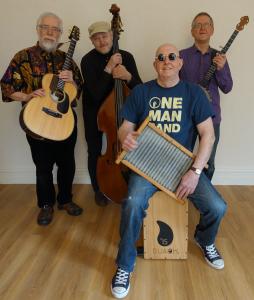
The Good Ole Boys treated us to an hour of classic American songs from the first half of the 20th Century. I am not sure what you call this type of music. Maybe Old Timey? Whatever you call it, the audience (and the reviewer) loved it.
They opened with Doc Watson's Sitting On Top Of The World. Other famous tunes in their repertoire included Midnight Special, The Night That They Drove Old Dixey Down, Route 66, Worried Man Blues and San Francisco Bay Blues.
John McGrover played rhythm guitar and did most of the lead vocals. John also had a seemingly endless supply of Banjo jokes which were suffered well by Bernie Dart on banjo, guitar and occasional vocals. One topical joke was (Q) What is the difference between the Brexit negotiations and tuning a banjo. (A) Not a lot. They are both impossible but at least Brexit will be finished at some point. The other members of the band are Eric Culbert on various percussion instruments and Gary Booth on double bass.
Alex Watts
SONGTIME - Margaret Ferguson & The Maia Singers
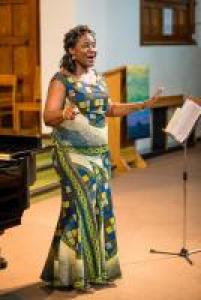
This was a great evening’s entertainment before a capacity audience. Margaret Ferguson has an amazing voice and an infectious and bubbly personality and the choir is just tip top.
There must be a limit to the number of times one can use superlatives in a review – suffice to say Margaret is just wonderful always. A larger than life personality with a voice to die for. The choir of about 30+ strong in tune with part-singing of an impeccable standard. Their diction and communication with the audience was a pleasure to behold. Margaret and the choir singing together was an experience to treasure. Excellent direction from John Pomphrey was more than matched by sympathetic and incredible musicality from Ian Tate the accompanist. Ian is a great pianist and musician which was demonstrated splendidly in his solo rendition of Liszt - “Consolation No 2.” This man is just so musical.
In a mixed and varied programme the highlights for me were: “Every time I feel the Spirit” (fast and infectious), “Vodka” (Margaret at her comedic best), and the Gershwin medley that was the finale of the evening.
We were treated ti 3 really splendid encores from Margaret. There was one other soloist in the concert, a lady called Felicity Wicks who sang with the choir in “Duermo Negrito” by Emilio Sole - what a lovely voice!
If you haven’t heard Margaret Ferguson, or the Maia singers then your musical education has been sadly neglected, I’m sure they will be back for years to come – don’t miss them; they are fabulous
Andrew Hodkinson
OF PEOPLE AND PLACE - Cenote
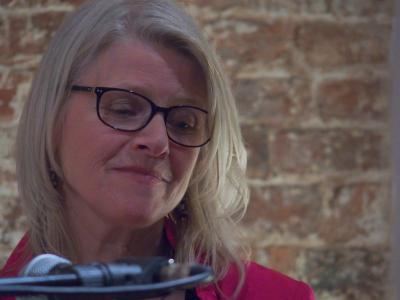
Of People and Place is a collection of original songs presented by songwriter Carol Fieldhouse (vocals, guitar, piano) and multi-instrumentalist Nigel Corbett (fiddle, guitar). Each piece has an interesting and unique story behind it, ranging from a photograph of sand dunes covered in snow to the tale of a Scottish 'king of gypsies'.
The first song, titled 'Birdsong', was written after Carol heard a lark singing while travelling through Northern France near the site of the Battle of Verdun. This song immediately set a soothing atmosphere for the rest of the performance, and demonstrated the musical talents that both Carol and Nigel possessed. This was followed by the song 'Linen', the title track of Carol's 2016 album Linen, which was highly praised. The following song was named 'Sulaymaniyah' after a place in Northern Iraq, in reference to the snowstorm which swept over many areas of the Middle East.
Carol then presented four songs from a songwriting project exploring the theme of motherhood in which she worked with four mothers of different ages to co-write songs reflecting their feelings of their children growing up. My favourite of these pieces was 'Little Red Scarf' which made excellent use of the piano as well as the usual fantastic vocal performance.
The second half of the songs consisted of more traditional-sounding folk songs, such as '10,000 Miles' also known as 'Fare Thee Well'. The solo fiddle piece 'Ashokan Farewell' was a solo fiddle piece that gave the opportunity for Nigel to show his skill, which was amplified by the acoustics in the lovely Green Man Gallery. The final piece, entitled 'Billy Marshall' after the 'King of Gypsies' from Galloway in Scotland, is my personal favourite and was suitably in the Celtic style, telling the apparently true story of Billy in a more upbeat tone. It was the perfect final song of this wonderful and interesting performance.
Benjamin Cusco
PURCELL'S SWEET TORMENT - Mr Simpson's Little Consort

Bless Mr Simpson’s Little Consort on two counts: for coming to Buxton to entertain us and for providing such good programme notes - a boon for a tired but happy reviewer! They take their name from a 17th Century English viol virtuoso, Christopher Simpson. This programme explores “the theme of love and the influence of Italian Baroque on (the) greatest English composer”. Whether or not Purcell is the greatest English composer is a matter of opinion but he surely had no serious rivals to that claim for over 300 years.
The Italian composers presented here as influences included Caccini, Piccinini, Cima and, of course, Monteverdi - all of whom have become increasingly familiar to us in recent years with the extensive research and recording of ‘early music’. Similarly we are now used to viols and theorbos - Dawn Johnston had some amusing stories to tell of how the theorbo was first received.
Monteverdi’s Si dolce e’l tormento - sung by soprano Cate McKee - was especially enchanting. It was the Purcell that was especially convincing, however. I have got used to hearing much of this music sung by countertenor Alfred Deller - although he died nearly 40 years his legacy is considerable. Music for a while, O let me weep, Thou tun’st this world and Dido’s Lament were all performed with great dignity and elegance.
The Consort comprises: Cate McKee (soprano); Lucy Bignall (violin and recorder); Sue Snell (viols and recorders); Dawn Johnston (theorbo); Christine Whiffen (harpsichord); Piers Snell (bass viol). It is to be hoped that they become regular visitors to Buxton in July.
Further performances: 21 July - St John’s Church; 22 July - Eyam Parish Church
Keith Savage
INFORMAL MUSIC NIGHT - SONGS, JIGS, REELS, SLIDES - The Occasional Band
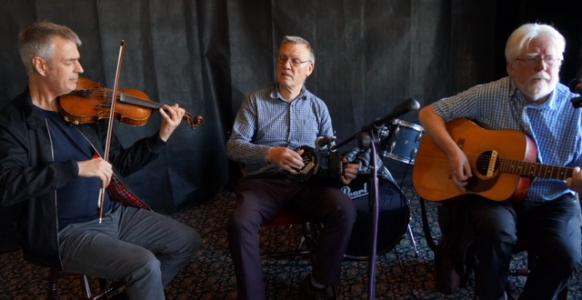
I don’t think The Occasional Band would mind being described as a ‘pub band’ - after all they were doing a free gig in a pub! They are three mates who enjoy traditional music - especially Irish tunes - and who choose to play together. They are having a good time, create a good atmosphere and we enjoy ourselves - heavens, they had people up dancing and cheering for ‘One more’, so they must have been OK, mustn’t they?
Alec (guitar) comes from Derry and Andy (concertina) from Belfast and they share most of the singing duties and it is no surprise that a fair number of Irish songs were on the set list. So, for example, The Star of County Down had the old harp tune Morgan Megan tacked onto it. And although they said ‘no singalongs’ in the Fringe programme, Billy O’Shea has such a strong chorus that it’s impossible not to join in.
As it happened some of the American songs went down best with the enthusiastic audience. Stephen Foster’s Hard Times has been widely covered and hearing it reminds you why. It is a powerful and relevant song more than 150 years after it was composed. Sara Watkins Will We Go, on the other hand, is less than 10 years old.
Of the other more recent songs Hidden Love by Four Men and A Dog came over well but it was the various polkas, slides and reels that really put the smiles on peoples’ faces. These also gave fiddle player Tim a chance to show what he could do.
A pub band or not The Occasional Band were well rehearsed and tight. They had put together a programme with thought and care and further, more regular performances would be surely welcome.
Keith Savage
CLUB ACOUSTIC AT THE FRINGE - Club Acoustic

Club Acoustic - ‘not really a club, and not always acoustic’ - has been a fixture at the Old Clubhouse for a good many years. A place for musicians - usually fairly local, but not always - to meet, play and sing. A place to try out new songs or share familiar favourites. It is friendly and supportive. Most years a CD is produced which benefits charities.
Apart from the originals you are likely to catch folk songs or versions of songs that are well established in folk club culture. It is as if the past 45 years of music making has not happened. But the singers and the audience are happy with what they do and why shouldn’t they be?
I only caught the second half of the evening, so apologies to those not reported here. Simply Layback had hoped to appear but Kevin Allsop who is a key member isn’t too well and so could not make it. Kevin is well known to many in Buxton and is much loved. Our best wishes to him.
Doug Torr is a Club regular. A modest sort of a bloke. He covered Sweet Baby James and Paul Simon’s America among other things. Very listenable is Doug. Sings in a direct, straightforward way, putting the song before himself.
No Joke were at two-thirds strength. We had Norman and Keith but no Joel who got himself a fancy gig elsewhere. As a duo or a trio they have won a lot of friends with their gentle humour and engaging performances. Playing guitars and ukuleles (with plenty of jokes at the poor ukes expense) they kicked off with Loudon Wainwright’s Swimming Song and Neil Young’s Old Man. Walkin’ On Sunshine came as a bit of a surprise but the Everly Brothers restored the equilibrium.
Club Acoustic usually meets on the 1st and 3rd Wednesday of each month and doors open at 8.30pm.
Keith Savage
UNE VIE EN ROSE - Adrien Mastrosimone

Une Vie en Rose began with a live band, featuring piano, double bass and percussion. Then French countertenor Adrien Mastrosimone ran onto the stage, bringing with him his outgoing and confident personality. All the members of the band were wearing black and pink, in order to tie in with Edith Piaf's song - La Vie en Rose, or Life in Pink, which the show was named after. Adrien's passion and devotion to Edith Piaf was apparent and he brought her to life with interesting anecdotes and fascinating facts as well as harnessing the band’s talent and offering amazing performances of her songs.
Adrien danced his way around the stage, while at the same time explaining the juxtaposition of love, death, dance and sadness at the heart of Edith Piaf’s music as well as her passion for entertaining. We heard about the tragic death of Piaf’s lover, Marcel Cerdan, and how she performed on stage soon after learning of his death, dedicating her performance to him. Adrien talked about his late grandmother and how he had taken inspiration from Piaf to perform in her honour. The band performed famous and poignant songs, such as Non je ne regrette rien, Padam Padam and L'Accordeoniste, with Adrien bringing his talent and charm to these very recognisable and iconic works.
Une Vie en Rose is performed 19th July 5:30pm-6:25pm, 20th July 1pm-1:55pm, 21st July 5:30pm-6:25pm and 22nd July 2:45pm-3:40pm at Underground at the Clubhouse. This really is a must-see show that entertains and surprises. You will thoroughly enjoy it!
Alice Featherstone
BUXTON STUDIO CHOIR PRESENTS... ANOTHER CONCERT! - Buxton Studio Choir
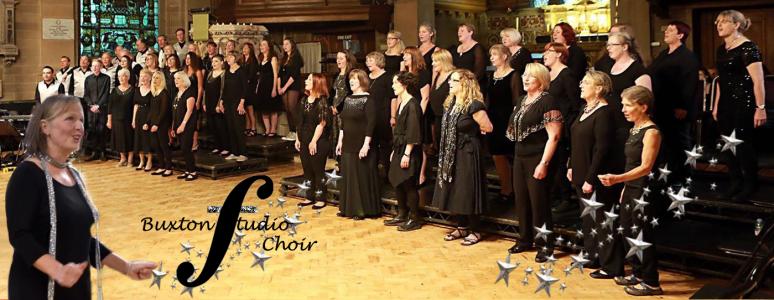
A warm, summer evening. The Palace Hotel. A large choir. An even larger audience! The Buxton Studio Choir returned to Buxton Fringe with a delightful evening of song. The concert opened to Hold Back The River, led by Thom Norman on vocals and guitar (complete with hat). The choir walked in singing this up-lifting number to take their places on the simple stage. It was a strong start and set the tone for the evening. The Studio Choir entertained us with a selection of familiar and popular numbers, including Sway, Happy Together, and I’ll Be There in the first half. There were then some smaller break-out groups. The men’s chorus treated us to This Boy by The Beatles and then a mixed chorus performed And I Love Her. Another small group performed Black is the Colour with real emotion and wonderful harmonies.
An interval allowed a breath of fresh air, and it was already clear the audience were enjoying their evening. Back in for another selection of songs such as Can’t Help Falling in Love, Higher and Higher (which Choir Director, Janet Galloway joined in with some lead vocals) and God Only Knows. The audience, naturally, demanded a few encores which the choir happily obliged with. As they reprised Hold Back The River their evident enjoyment was plain to see. Throughout the evening the choir kept the audience engaged, and it was a very ‘smiley’ performance. There was a hugely positive response from the audience and the room felt full of reciprocal appreciation and positive vibes.
Janet Galloway led her choir with confidence and a deft touch of musicality. There was opportunity for individuals to pick up lines, but quite rightly, as this is a choir and not a solo show, the emphasis was on group singing, and using the different voices together – and this is their strength. The choir tackled some complex arrangements with accomplishment, giving a strong ensemble performance. A relaxed evening, in good company with great singing.
Maria Carnegie
AN EVENING WITH CATHY RIMER - Cathy Rimer
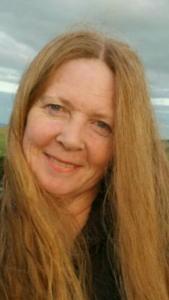
After a few technical difficulties, Cathy’s first two songs were 'I See You In My Dreams', which she performed with an Indian hand drum, and 'By the Harborside'. The latter was sung a cappella and following an outfit change to make herself look more ‘fisher woman’! This suited the context of the song and really animated her performance! Her charming and charismatic personality shone throughout, and when talking to her after her show, the passion and pleasure she takes in performing and songwriting was obvious. Her beautiful voice and heartfelt songs recalling her personal spiritual experiences made for a very enjoyable and interesting show, making the audience feel relaxed and very comfortable.
All 25 of her original songs were personal in tone and distinctively written and performed. 'Summer's Child', written a few years previously, was dedicated to her ill daughter and proved very heart-warming, particularly when talking about her daughter dancing. Cathy lit up when talking about her daughter, who obviously meant so much to her! For ‘Autumn Leaves’ and ‘Take My Hand’, her lovely voice was accompanied by a beautiful, plucking melody on the guitar.
Cathy performs again on Saturday 21st at 6pm at the Green Man Gallery, and I would highly recommend that you go along for a lovely evening with the very talented Cathy Rimer.
Alice Featherstone
ORCHESTRAL CONCERT - The High Peak Orchestra
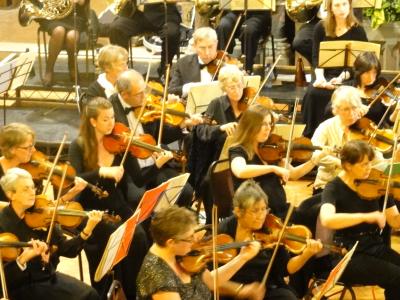
The High Peak Orchestra, formed over 40 years ago, is based in Whaley Bridge and is well known locally for many concert performances over the years. It states on their website that the HPO generate a friendly and welcoming atmosphere, though I surmise that the sense of occasion of tonight’s Fringe concert may have compromised their engagement with the audience, the event seemed somewhat austere and a costly privilege to attend. There was a full house and consequently they don’t seem to need a public interface at the present but if neglected, the reputation earned in past years may require effort to rebuild.
The conductor David Chatwin has held the baton for a year and his CV lists impeccable credentials, bringing long and varied professional experience from the orchestral world. Although he didn’t engage much with his audience which may not actually matter, there seems to be some work in progress for him to capture the attention of the orchestra, particularly the strings. There is obviously a balance to be struck between reasonable discipline in the interests of the musical achievement and tyrannical insanity which kills enjoyment and ultimately loses cooperation of the players. David generally gets a promising write up elsewhere but wasn’t particularly accessible tonight; perhaps some other time. I hope his tenure with the HPO will prove inspiring.
The first half of the concert was devoted to works of Tchaikovsky. The Waltz and the well known Polonaise from the grand ball scene from the opera ‘Eugene Onegin’ are often heard as a stand alone pieces. Taking the first piece at a steady tempo was a good strategy in this case as both tunes are not as easy as they should sound and it enabled the orchestra to hold a firm rhythm. In the waltz the woodwind leads came through well and the heavier brass sounded clear and emphatic in the Polonaise. The overall effect was very pleasing.
Highlight of both this evening’s concert was undoubtedly the Tchaikovsky ‘1st Piano Concerto’ performance of Matthew McLachlan. At 18 years of age, Matthew has an impressive catalogue of musical achievements behind him. He quite evidently has a musically motivated family and whist one reads about his educational opportunities at Wells and Cheethams and his prodigious success in exams and key prize winnings, recent years have seen him promoted in numerous recitals with repertoire firmly securing his place in top professional ranks. We rarely hear playing of Matthew’s calibre in Buxton even from the celebrities. He is in full command of the magnificent grand piano which was tonight generously provided by Kawai. As a sign of genius his playing seemed effortless whilst in pulling out all the dynamics and virtuosity of this extremely demanding piece, which is only contemplated by but a handful of the top pianists internationally.
The first movement of Tchaikovsky 1 starts with bold chords from the horn chorus, very exposed, oh well. Then the big sound statement, chords up and down the keyboard with huge panache and flamboyance left us in no doubt about the flavour for the piece to follow. The tempo was taken at a brisk pace adding a brilliance to Matthew’s performance. As the 2nd subject launched by the piano, the accompanying strings were only just hanging in there, and throughout the piano lead the way with the diabolically difficult runs played with pin-point accuracy to dramatic climaxes with the accompanying orchestra close on his tail. The dramatic and furious double octave passages contrasting the drama of sudden serenity with the leggiero passages evoking mountain streams or whatever, were absolutely brilliant. The dramatic heavy brass entry, nicely in time with 3 trombones, 2 trumpets (and a curiously vacant seat for this piece), taken up by the strings valiantly sawing away was exciting enough until the powerful piano entry totally upstaged the band, taking the piece into overdrive. And then with amazing composure Matthew returned the hall to tranquility.
The second movement did allow the orchestra have a moment of glory with lovely flute solo stating the theme beautifully, backed with a clear tone from the oboe and the 2 cellos on the front desk adding a very smooth melody. The prestissimo section again gave the floor to pianistic virtuosity. The third movement which has echoes of Eastern European folk tunes sounded tricky with some quick interjections “round the band” following the rapid fire phrases from the piano. Sounded like a game of “throw and catch the ball” at break-neck speed. Great fun to listen to and wonderfully done. I think the orchestra would have been happier with a steadier tempo and again the strings were just about hanging in there but it was worth the pain! In this gargantuan piano work with arguably the best writing in the repertoire, at the grand finale, just as it seems to be all over the piano comes back with some more excitement and in Matthew’s case to “bring the house down”. A sigh of relief that the band didn’t disgrace themselves in the presence of a virtuoso. Matthew McLachlan is a name to look out for!
At the interval there was a feeling of rapturous elation followed by a realisation that the concerto would be an impossible act to follow; everything thereafter would inevitably be downhill. The second half was a performance of Sibelius Symphony No 5 and in comparison seemed a lack-lustre turn. The first movement is undoubtedly tricky and can sound wearisome if the melodic ideas are not expressed clearly, making sure there is an interactive dialogue between the solo instruments. The violins could look at bowing in coordination with the leader during their sectional rehearsals as in some parts they could do with the expressive shapes sounding as one. As the movement “grows” in complexity and tempo it can feel like a race to the bottom with the stretto feel tending to ride a roller coaster. In the second slower movement the horn section feature and after a tentative start got into their stride towards the end forming a cohesive ensemble. The final movement starts allegro molto though the orchestra took it at a more modest tempo which is a good idea allowing the violins to play the tremulando passage with more control avoiding the pitfall of disintegrating into a mush of notes. As the piece goes towards the largamente the orchestra seemed to be holding together better. The horn passages, more convincing than in previous movements are supposed to have been inspired by swans and give way to a maestoso feel with sweet sounding muted strings and woodwind giving a suggestion of double time. As the symphony moves to the big finish the overall orchestral sound was in very good acoustic balance.
The surplus from this evening’s concert is destined to support Blythe House Hospice, a local facility doing invaluable work for the terminally ill; as always sadly in need of funding.
The HPO appears to have all the ingredients of a very good orchestra and a society offering an marvellous opportunity for amateur music making, fulfilling a role which it has done for 40 years.
Brian K W Lightowler
HERDING CATZ BIG ROCKING BLUES NIGHT - Herding Catz Blues Band
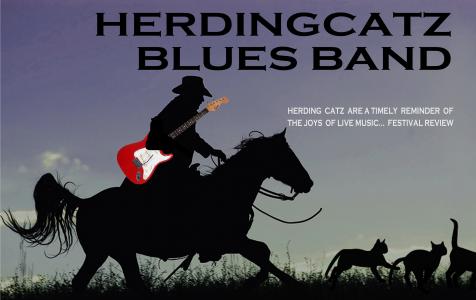
As Herding Catz launced into their opening number "Route 66" it was clear that we were in for a good evening although it felt slightly strange to be listening to driving electric blues under the high ceilings and surrounded by the rococo decorations of the Chatsworth room in the Palace hotel. This sort of music should be played in a low ceilinged sweaty dive!! The band is based in Buxton but regularly do gigs and festivals in a 60 mile radius.
They played mostly cover versions by the likes of Ry Cooder, Peter Green, Eric Clapton, Steve Miller, Joe Bonamassa and BB King. I particularly enjoyed their versions of Jimmy Reed's Bright Lights Big City and Timbuk3's The Future's So Bright but the whole set was very entertaining.
This was the first time that I had seen the Catz and I was impressed with how tight the band was. The rhythm section of Adrian Sherwood on bass and vocals and Chris Love on drums kept the groove well. Rob Radley's lead guitar is as good as you will hear anywhere. The front man Peter Buxton plays rhythm guitar and harmonica as well as singing lead vocals with passion.
They are regulars on the Fringe as well as playing many other local gigs through out the year. More details are available at http://www.herdingcatzbluesband.com.
Alex Watts
ANNETTE GREGORY PRESENTS LADIES OF JAZZ - Annette Gregory & Band
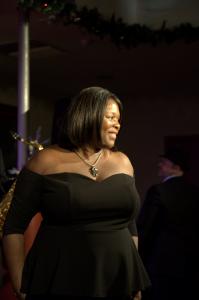
Annette brought her Ella Fitzgerald show to Buxton last year and whilst she is not finished with Ella she wants to showcase other women who have contributed to the musical heritage that is jazz. Annette is not a mimic - she is honouring other singers and musicians but with musical director and pianist John McDonald she is prepared to offer a fresh twist to a song.
For example Ev’ry Time We Say Goodbye (which clearly is an Ella song) was taken slightly faster than you might expect and was sung unaccompanied. The Way You Look Tonight (co-written by Dorothy Fields with Jerome Kern and the Oscar-winning song from Swing Time in 1936) was, on the other hand, significantly slower than often heard and was, as a result, a little more wistful.
One of the less well known songs in the set - June Christy’s Something Cool - was received especially warmly. The Billie Holiday selections - Lover Man, Drivin’ Me Crazy and God Bless The Child - went down well in the first set. Similarly the second half opening of Nina Simone’s Love me or leave me, I put a spell on you and My baby don’t care for me were good and popular choices.
Annette and John squeezed 24 songs (including Cry me a river, On a clear day and Green Dolphin Street) into the evening but it never felt like a rush. Annette has a smooth vocal style and a genuine, warm personality. She already has many fans in Buxton. If she returns she will surely make more.
Keith Savage
SUMMER GUITARS: SOLO & DUO MASTERPIECES - Ed Billingham and Jo Kay - Classical Guitar
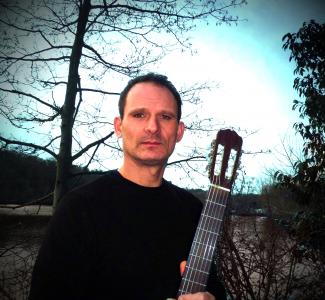
Just last night someone was lamenting to me that they had recently been to Seville and didn’t hear a single person playing the Spanish guitar. Well, they should have been at Burbage Institute this evening. After yet another sweltering day, the sun was still streaming through the windows at the back of the stage providing a perfect setting for an evening of classical guitar music.
I have to admit my heart had sunk slightly when I spotted a couple of the perennial favourites on the program, but my fears were immediately dispelled by Ed Billingham opening with a suite of pieces originally composed for the lute by Vincenzo Galilei. I was immediately struck by Ed’s expressive power and rich range of tones that he managed to extract from his Romanian-made guitar. From a dropped D tuning, Ed then moved to standard tuning to tackle a Toccata in Em by Bach. Ed described this as ‘guitar friendly’ due to its key. However, it was originally written for the piano and some of the note intervals made for distinctly unfriendly guitar stretches which at times interfered with the playing fluency. On safer ground was the first half closer, a pair of contrasting pieces for the guitar by Manuel Ponce for which Ed managed to conjure up exactly the right Latin American feel.
The second half opened with Ed playing Five Bagatelles by William Walton. These were wonderfully well executed. Ed explained that Julian Bream played a hand in their composition, and there was definitely a touch of the Bream in his confident and expressive playing of the false harmonics. We then went on to the ‘staples’ - Recuerdos de la Alhambra by Tarrega and Asturias by Albeniz. These have been played so much over the years, yet it is to Ed’s credit that he somehow managed to inject fresh vigour and colour into these pieces thanks to his marvellously expressive playing. I am not sure if I have heard the devilishly difficult tremolo on Recuerdos played which such confidence and lyricism.
Ed was then joined by Jo Kay for a couple of duets; Morenita do Brazil by Farrauto and Danza Espanola by Granados. They play well together; there is clearly a deep musical understanding going on. Their guitars have different, but complementary tones, which they exploited effectively. For an encore, Ed then gave us Prelude No 1 by Villa Lobos, beautifully executed with a pleasing infusion of passion.
Fred Rolland
SMOKY FOLK - Cath McGrother, Mike Clement and Netta Christie
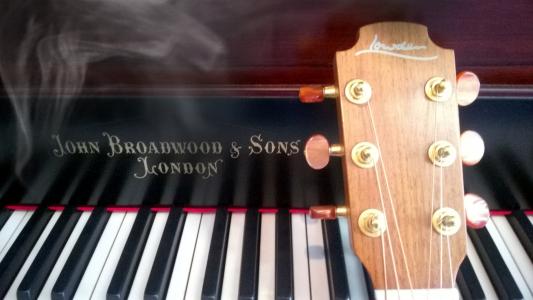
The Festival Fringe achieves all manner of things. One of them is to encourage people to put on a show or an event. If it was not for the Fringe then shows like Smoky Folk probably would not happen - and we would all be the worse for it.
Netta and Michael are well known in Buxton through the Discover Buxton Victorian Tram enterprise. Michael arrived here via Jarrow and Netta from Rochdale (or ‘the south’ as Michael insists). Cath is from Rotherham but is a regular visitor and has many friends here. It might sound like a local show but it was far from parochial.
Netta described her role as being like a shepherdess ‘but two people less like sheep you could not find’. She did find time to tell of her Aunt Nellie who summed up Ken Dodd: ‘he’s alright if you want a laugh’. Otherwise Cath and Michael managed themselves devising the setlist as the evening progressed.
Michael had been keen to do the gig because he wanted to work with Cath but also because he wanted to play the URC Broadwood grand piano which has been recently restored. He says it’s the most welcoming piano he has played and there was a tenderness about his playing all night. Michael has an affection for the music of Sting and often sings his songs and, of course, shares an accent. His version of Wrapped Around Your Finger brought out the richness of a song that is sometimes lost in a rock version.
For me it was his version of Jacques Brel’s The Tender Hearts that was the real highlight of his songs. As Netta observed music making has a capacity to touch us and move us in ways that other art can’t quite. Music is a shared and immediate audience experience.
Cath sang a mixture of originals and covers. Neil Young’s After the Goldrush and The Incredible String Band’s Paintbox will give you a clue as to where she comes from musically. It is her own songs that really win the day. She is able to combine small, personal experiences and bigger world events. I Found You A Picture began with the discovery of pictures of her mother as a young woman and ended with the hope that the Hillsborough families might find some consolation in memories evoked by photos of those that they had lost.
The Road was a song about the migration of her own family and the experiences of other economic migrants and Michael found some gentle chords to accompany Cath. Each finished with a singalong - Edelweiss (Michael), Leaving on a jet plane (Cath) - to conclude a thoroughly satisfying evening.
Keith Savage
CATZ ROCK TO THE SUN - Herding Catz Blues Band
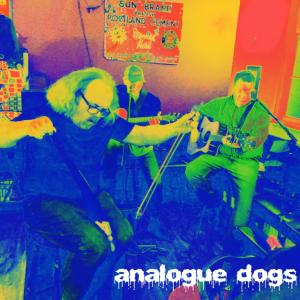
Traditionally, Inns were divided into small rooms which suited the varied clientele including of course class divisions of masters and servants. This was especially important for travellers where accommodation was required. The Old Sun is one such establishment and recent renovation has preserved the layout with each room leading to another.
While this layout is interesting and cosy it doesn’t easily lend itself to live music as the largest room can only accommodate an audience of a dozen or so. Still, in spite of the difficulties and to their credit the Old Sun continues to host events and the ‘Herding Catz’ was their contribution to this year’s Fringe.
The Herding Catz duo are talented and entertaining but ‘rocking blues’ this wasn’t. Perhaps ‘Herding Catz Middle of the Road Music Night’ wouldn’t have had the same ring. The Catz provided a musical background to the pub patrons and were enjoyed by the audience – which possibly due to the room layout seemed to change periodically.
I couldn’t help but feel that the Catz were held back and played safe with their music (‘Norwegian Wood ‘, ‘Whisky in the Jar’ anybody?) which was comfortable enough and offended no-one. Keep an eye out for a venue where they can let rip and give us authentic ‘Rocking Blues’.
Brian Kirman
SUMMER CHAMBER EVENING - Cheshire Chamber Collective
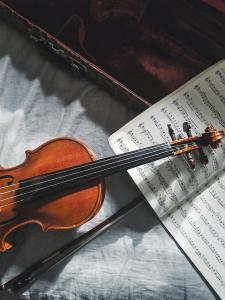
The members of the Cheshire Chamber Collective are drawn from the Cheshire Sinfonia who, in their own words, love exploring and performing the chamber repertoire. That joy and enthusiasm was much in evidence throughout this masterful performance.
Cheshire Chamber Collective made an impressive debut at the Buxton Festival Fringe in 2015 and in 2016 won the Large Ensemble award. The quality that brought that accolade shone through again as Cheshire Chamber Collective provided its audience with a varied and multi-national programme of chamber music.
One of the beauties of chamber music is that, compared to full orchestral works, it allows the audience to appreciate the contribution made by each instrument and the selected programme gave ample opportunity for this. The first half of the programme featured Witt’s Septet in F major for string and wind instruments and Dvorak’s string Quintet in G major. The first piece of the second half was composed by the French flautist and conductor Taffanel for the wind quintet followed by a leap into the 20th century with Arrieu’s Wind Quintet in C.
The final pieces showcased a more contemporary style but were delivered with the same panache and skill as the earlier programme. Oblivion and Libertango by the Argentinian Piazzolla who revolutionised traditional tango music, were arranged for the ensemble by violist Adrienne Spilsbury. In her introduction to these pieces she told the audience that we would be leaving with a spring in our step and indeed we did.
What could be better than spending a warm, summer evening immersed in high quality chamber music performed exquisitely by the very talented members of Cheshire Chamber Collective?
Vernon McGarey
SONGFEST - Kaleidoscope Community Choir
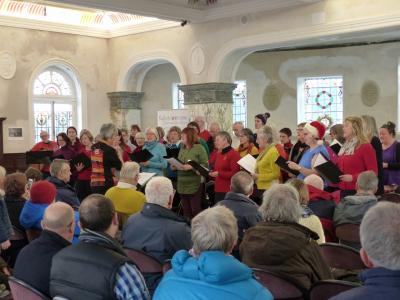
‘A selection of songs from around the world celebrating the joy of singing together’ is what concert goers were promised in the Buxton Festival Fringe programme, and this is without doubt what we heard!
Kaleidoscope Choir started in 2013 as an outreach collaboration between Buxton International Festival and Buxton Opera House. With around 50 members of all ages, some of whom travel from a wide area around Buxton, the choir meets on Tuesday lunchtimes between 1pm - 2pm in the Methodist Church Hall, and new singers of all levels are always welcome – just arrive and sing – no need to be able to read music. The choir repertoire is eclectic, with pieces as diverse as songs written by local writers, timeless tunes such as Irving Berlin’s Simple Melody, and classical pieces such as Verdi’s Va Pensiero, of which more later. Earlier this summer the choir received a commendation for character and expression in the Buxton Music, Speech and Drama Festival.
Kaleidoscope’s choir leader, Carol Bowns, has been involved in singing all her life as a soloist, teacher, choir member and choral conductor. She particularly enjoys sharing her love of singing with the community by encouraging others to sing, and she values the opportunities this offers her members for new friendships and interests. Carol has been with Kaleidoscope since its inception, and is also the founding conductor of Tideswell Singers.
For this event, a mixed audience of 70-80 people, including children, congregated in the Spiegeltent, a magical space in the Pavilion Gardens, with opulent decoration, stained glass and gilded mirrors (hence the name) all under a circus style canopy. Carol fittingly introduced us to ‘the Kaleidoscope choir in a kaleidoscopic tent’.
The choir presented eleven pieces – too many to review individually. Some were sung without accompaniment, some with the addition of accomplished guitar work from Carol’s husband Ian, and some to recorded backing tracks. Several stood out for a variety of reasons.
‘How Sweet the Sound’ was the familiar ‘Amazing Grace’, combined with other music to give a complex blend of harmonies and round singing with the familiar tune woven through. Mary Mack, with its rousing Gallic influence, was clearly enjoyed by the choir as well as the audience, and ‘Simple Melody’ (Berlin) showcased ever more complex parts built on the strong foundation provided by the male singers. ‘The Rhythm of Life’ from ‘Sweet Charity’ can be a difficult piece to achieve, but Kaleidoscope pulled it off with enthusiasm and clarity. As part of the choir’s connection with Buxton Festival, they were asked to offer some Verdi – the swelling introductory notes of the orchestra track of ‘Va Pensiero’ (The Chorus of the Hebrew Slaves) led into the choir singing in both Italian and English in this difficult piece. Well done to the whole choir for the emotive tonal spread here, and to the sopranos for achieving those top notes in this acoustically challenging venue. The final song was without doubt this reviewer’s favourite piece – ‘Shto mi e milo’, with its typically Eastern European harmonies and parts for lower fuller voices, was excellent!
The audience were very appreciative of this varied repertoire – all in all, a fun and sometimes evocative presentation in a beautiful setting, with a committed community group clearly inspired by their leader. Their enthusiasm, and their gift to her at the end of the concert, are testament to her hard work and dedication.
Jo Lewis
JOHNNY DYSFUNCTIONAL & SOUNDS BIZARRE - Dolls House Productions
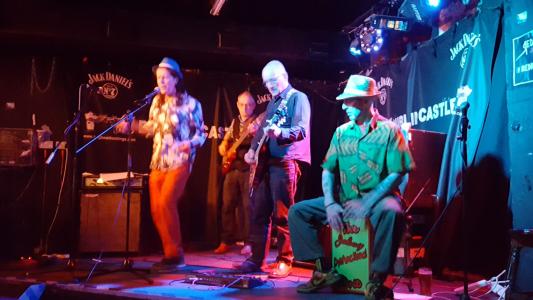
We like it when a Buxton Fringe Award winner returns to the scene of their triumph, and last night we had the pleasure of Johnny and the boys playing more of the own songs about modern life to an appreciative audience, some of whom are from as far away as Wimbledon!
The band members are all ‘local lads’ and they gave us a show of sly, comic songs interspersed with anecdotes and humour. Who knew for example that ¾ of the band had been film extras at some point and that Bongo Bob had appeared in Quadrophenia? So they created a great rapport with the audience, which was needed when they were asked to howl like dogs for the chorus of one tune!
Plenty of foot tapping and clapping was in evidence for a shortish show, which might benefit from a different venue – one that might allow the audience to boogie on down as they say in some circles. Oh yes, the venue might also benefit from some air conditioning, but that’s beyond the band’s realm.
They’re back again on the 21st at the same venue, so get down there and support the Fringe and local artistes!
Ian Parker Heath
MUSIC FOR VIOLIN AND ORGAN - Steven Wilkie and Simon Mercer
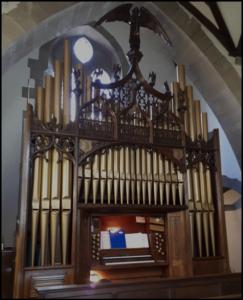
We received a friendly welcome at St Marys Church, Dale Road. It was another beautiful afternoon in this exceptional summer we are having and the music complemented it.
I never realised how beautiful the unusual combination of organ and violin could sound as it did in the beautiful church with its great acoustics.
The music was played by Steven Wilkie (violin) and Simon Mercer (organ) both eminent performers and teachers. They have been colleagues for years but this is the first time they have played together in a concert . Thanks to modern technology we could see the organist. Both the musicians gave short interesting descriptions about the music they were about to play which enhanced the enjoyment of the music. Simon said that the combination of violin and organ is most suited to Baroque music but several English compositions were also equally suited.
It was the greatest of Baroque composers Handel and Bach who opened and ended the concert. Handel’s piece was the Sonata for violin op 1 no. 12 in F major and the Bach’s piece was Sonata for violin und Klavier BWV1016. These are incredibly marvellous works and so well played.
It is obvious that these musicians have a special affinity with English music. They played the well-known Elgar piece’ Salut d’amour’ and they conveyed the fun jovial piece ‘Bagatelle’ by Ireland very convincingly. They also played Elgar’s ‘Sospiri op 70 which he originally intended for violin and piano conveying superbly what I think could be described as melancholy sighs. It was intended as a companion piece to Salut d’ amour but Elgar realised it was more intense.
It was the playing of Gerald Finzi ‘s ‘Introit’ that was a special 8 minutes for me and many members of the audience I guess with its emotional intensity. Simon explained that this was a movement from a violin concerto much of which the very self-critical Finzi had rejected. I think it was influenced by the death of many close friends of Finzi through his short life. There was a recurring few notes throughout the piece which expressed this. In this music we can see how Finzi can be placed with English composers such as Elgar, Stanford, Parry and perhaps most of all with Vaughan Williams. The music has much in common with Vaughan Williams and perhaps the soaring violin may remind people of Vaughan Williams ever popular ‘The Lark Ascending’.
We also enjoyed the piece called ‘Meditation ‘by Massenet
We have had a great experience this afternoon thanks to these two musicians and St Mary’s Church.
Roger Horvath
JILL CROSSLAND PIANO RECITAL - Jill Crossland

How good it was to hear the newly refurbished Broadwood Grand Piano being played by such an accomplished performer. Not only a great pianist but one with a prodigious memory – not a piece of music in sight!
The Scarletti Sonata was a perfect opening work and showed us what the pianist, and the piano, had to offer. And moving on to the Bach “48” was a perfect progression. The interpretation was a little too romantic for my taste as I prefer my Bach a little 'straight'! Each to his own. There was no getting away from the fact that Jill Crossland is an outstanding and thoroughly individual performer with very personal feelings about interpretation.
No sooner had the Bach stopped than Jill launched into the Chopin pieces, which were played with elan and style with plenty of opportunity for personal rubato which we got in spades. All to suddenly the interval was upon us, and I couldn't wait for the 2nd half of the recital.
Schubert to begin with and inspite of these pieces being 'lighter' music, Jill managed to bring out the composer's more serious and dramatic side especially in the Impromtus. Then the star turn of the evening – the Beethoven Pathétique Sonata. A Beethoven sonata played on a restored 1890's Broadwood piano – it doesn't get much better. I realize that this is not a Broadwood that Beethoven would have known (too modern), but Broadwood and Beethoven were inextricably linked. There is history there, mutual respect and appreciation. As there is between Jill and the composers she chose for this recital. They were played with scholastic accuracy, and above all with love; sometimes more love than was necessary! Jill's interpretation of the 2nd movement was nothing short of sublime.
If I had one tiny little moan it was that I would have loved to hear Jill just say a few words to the audience. I would have liked to be acknowledged and maybe even appreciated rather than just played at, albeit extremely well.
Andrew Hodkinson
ALL THAT JAZZ & A LITTLE BIT BLUE - Basin Street Jazz & Blues
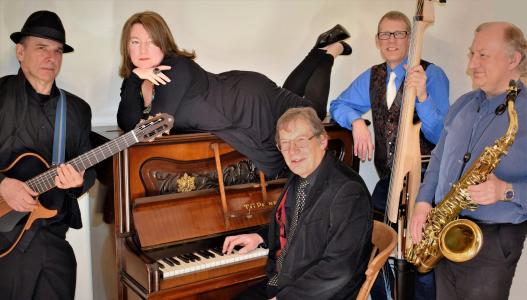
The capacious High Peak Room - even with a good sized audience - is never going to be the most intimate experience. There is always going to be quite a physical gap to bridge. It is to the credit of Basin Street Jazz & Blues that they are able to generate real warmth in this environment.
The Band began with a nice friendly be-bop opener, Groovin’ High, to get everyone relaxed and and in the mood before the first ballad of the evening featuring vocalist Jules Scott with the hit song from La La Land. A couple of songs associated with great singers Lullaby on Birdland (Ella Fitzgerald) and a Nina Simone rocking blues followed.
Basin Street Blues offered the chance for two of the band’s principal soloists - Mike Dale (tenor sax) and Brian Lightowler (piano) to shine. Is You Is Or Is You Ain’t My Baby further illustrated the Band’s preferred territory. Elvis Costello’s Almost Blue, whilst more modern, is clearly rooted in the jazz band era.
Miss Otis Regrets was sung by bassist, Adrian Sherwood, accompanied by guitarist Fred Rolland. Jules returned with the rest of the Band for a cheery Sunny Side of the Street with solos by Fred, Brian and Mike.
Part two began with Nature Boy - this is one of favourite tunes and I am reluctant to see it tampered with. The Band’s Latin arrangement certainly gave it a different twist. Nobody’s Fault By Mine and Jelly Roll Morton’s Sweet Substitute kept the blues mood rolling and the languorous tempo suited the soloists. A Little Bit of Rain was a more modern blues and as someone nearby observed “this is not rabble rousing blues”. Whether that was intended as a compliment or not is for you to judge. Blues music is, after all, a form of protest and an element of anger is justified.
Django Rheinhardt’s Nuage is always going to be a test and Fred’s guitar accompanied by Brian’s accordion saw them pull it off. Mike’s warm tenor sounded well here. The lovely bossa nova The Gentle Rain was sung by Jules accompanied just by Fred. Brother Can You Can Spare A Time? was perhaps further evidence of the BSJ&B emphasis on smooth calm rather than agitation. They rendered a song born of the Great Depression with some equanimity. Summertime might be too obvious but Fred Rolland’s solo work lends a freshness to the standard.
Yardbird Suite changed the tempo and style. One For My Baby And One More For The Road provided a finale every bit as friendly as the opening Groovin’ High. The Band was prevailed on to play one final Dixieland dance tune and the reception suggested that a bit more of the same would be appreciated.
Further performance on 13 July
Keith Savage
AN AFTERNOON OF DELIGHTS - Vocivoices
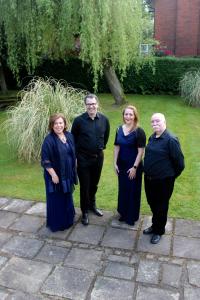
An afternoon of delights it certainly was. Just 4 singers and a pianist who started out with two well-known songs – A Wonderful Day like Today by Bricusse and Newly, and I can Give You the Starlight from the 'Dancing Years' by Ivor Novello, really set the scene – excellent singing with well matched voices. The audience of about 50 were clearly in for a good sing. The songs came thick and fast in a varied and popular program of well-known music, but then this group never disappoints.
Highlights for me were, Finicula, Finicula with Eric Cymbir taking the lead, Mon Coeur S'Ouvre a la Voix from Samson & Delilah, a little known Ave Maria by Donizzetti, and the famous Largo al Factotum from Rossini's 'Barber of Seville'. The intonation and ensemble work was as ever very nearly faultless and the enthusiasm was infectious.
These four singers (who I thought might have made more eye contact with the audience) were accompanied by the ever prodigious Jonathan Ellis. I am always full of admiration for the apparent ease with which Jonathan plays such demanding accompaniments, but if I had to make a criticism it would be that the varied and nuanced vocal lines were often masked by slightly too prominent and over-enthusiastic playing.
All in all though, this truly was a delightful afternoon and I look forward to many more years of entertainment.
Andrew Hodkinson
SINGING WITH BRASS - Tideswell Male Voice Choir & Burbage Brass Band
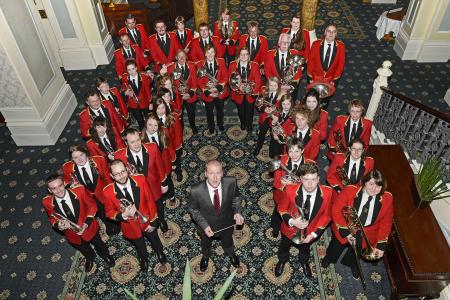
Tonight’s stage at the Methodists’ Church was shared by two great musical institutions of the town resulting in a wonderfully entertaining evening. Though quite different in emphasis, both organisations have in common a long history of fostering music learning in their communities, accepting novices and working towards achievement of a commendably high standard of musicianship.
Tideswell Male Voice Choir was formed in the 1950’s as a local choir in the village but quickly gathered momentum attracting singers from a wide area and enjoyed both deserved success in competitions and fame for their concerts throughout the UK and abroad. In recent years their numbers had dwindled in some degree associated with brewing discontent in the society. The appointment of their present musical director, experienced choral conductor, Nick Montague has turned their tide of fortune. The singers have a number of exciting gigs this year and tonight they fielded a most effective choir of 20 men forming a nice balance across the vocal range. The choir’s accompanist, Alison Wheeldon, a well know teacher in Buxton, completes the strong musical team and tonight she played unobtrusively yet with some passages of brilliance in quite challenging pianistic territory.
Burbage Brass Band started in 1861 for the recreation and morale of the local quarry workers and has been continuously active ever since, even during the wars when bandsmen became comrades. The community traditions remain strong and many of the current members joined as children, being provided with an instrument and free lessons to later join the Junior band and subsequently the senior band. There are currently over 40 players on the books in the early stages of learning the instrument. It is obvious that there is a cohesive loyalty to the band, who rehearse regularly in their own premises re-built 9 years ago. The conductor, Steve Critchlow, now in his 24th year in the role has successfully steered the main band from 4th division in 2011 to the present position in the 1st division of the National Contest scene.
Apart from the very last number of the concert, a slightly constrained choral version of ‘The Saints’ in which the band augmented the finale with some effective backing, the Choir and Band performed 2 sets each independently.
The choir started the concert with a tasteful arrangement of ‘Anthem’ from the Tim Rice’s musical ‘Chess’. The transit though the very ABBA feel good chord changes set the bar high for the mellifluous quality of this group. Alison’s accompaniment was lovely especially in the expansive chorus in this piece. Their rendition of ‘What a Wonderful World’ demonstrated the superb articulation of lyrics that the Tideswell MVC can achieve. The usual advice for a group of 20 either reciting or singing a verse is to grossly exaggerate the speech elements, to a level at which for individual speaking would sound ridiculous, whereas a group singing or speaking it sounds surprisingly comprehensible. The next stumbling block is to pronounce these elements precisely together so the 20 sound as one! Not many choirs achieve this for more than 10% of the time, which usually results in a muddy vocalization effect without meaningful lyrics. This choir seem to have the mastered the art of sounding as one and the words are crystal clear. Watching the conductor (and singing accordingly) is obviously crucial to success. In the Tideswell MVC their memorization of all the pieces clearly frees up the lines of sight from being ambushed by being transfixed in pages of sheet music. Also Nick works very hard both gesticulating and acting as auto-cue so there is no reasonable excuse for not singing together.
‘What would I do without my music’ was had the intended passion created by coordinated expression and singing with conviction of a group inspired.
The traditional American gospel song hijacked by the Welsh, Gwahoddiad was actually sung in English with allusions to themes of the cruxifiction of Jesus.
‘The American Trilogy’ is a well know arrangement of songs of the American Civil War, ‘Dixie’ and ‘Battle Hymn of the republic’, and the Bahamian spiritual ‘All my trials’. Popularized by Elvis Presley in 1970’s it works well as a solo, in barbers shop and tonight for Tideswell MVC. Again showcasing the tight coordination of the harmonious choir. The set finished with an upbeat version of the spiritual ‘Gonna rise up singing’. The singing was generally accurate though the coordination slipped a little in syncopation. The choreography may have been rather ambitious at times with some arms flailing against the tide s not so well. The tambourine was a good idea either on or off the beat and probably encouraged the audience to participate in some form of rhythmic clapping.
The band opened their 1st set with a lively march ‘Buxtonian’ commissioned for Burbage in 2011. Resplendent in their bright red uniforms trimmed with black and gold, they set their stall as a top class brass concert band. There was a good balance of pitches and the music resonated well in the space of the Methodists’ church building; The nimble articulation of some tricky passages for the cornet section was impressive indeed.
The Mozart overture to the opera ‘Abduction from the Seraglio’ which originally appeared in 1782 in Vienna, demonstrated the appeal of classical music to arrangement for the brass band format. The tenors and euphoniums handled the subjects with clarity. Steve’s conducting was in this, and all pieces, solid energetic and giving unmistakable directions which in general the band responded to confidently.
The flugel soloist in an arrangement of George Michael’s ‘Faith’ was Josh Tournier. Josh could be said to be one of many true members of the Burbage family being with the band man and boy. He played the lead part with a luscious smooth tone and delivered the more rhythmic sections with spot on accuracy. The all important phrasing is underpinned by good breath control which Josh has mastered. Though I wondered whether some of the band sounded a bit perplexed at times but they got away with it like professionals.
For the revival of ‘Batman the Movie’ from 1992, the composer Danny Elfman composed music which really does come over as an archetypal film score reflecting the sinister side of action in Gotham City. The long chords with crescendos and diminuendos captured the mystical suspense from the film and the Burbage Band acting together were able to control the dynamic changes most effectively.
After the interval, the band played the Ron Goodwin theme music to the film ‘633 Squadron’. For obvious reasons this music inspires patriotic optimism rather than symbolizing the devastating misery of battle and has become a standard in brass band repertoire. Tonight’s performance was rousing and clear, just like the champion band they are. I expect we will see Burbage at the top slot at the Albert Hall.
To show they can create moods of tranquility and sadness, the band played an arrangement an Irish Air ‘She moved though the fair’ depicting the lyrics of a song about an encounter with the ghost of the hero’s late betrothed re-enacting their last encounter in the market place. The rich chords were played with a beautiful smooth tone and articulated with precision.
Next up was an infectious toe-tapping contrast with a version of the ragtime march, ‘South Rampart Street Parade’. Fronted by soloists Jenny Conway on trombone with Michael Crookes and Nathan Gratton on cornets, we were transported in style to early 20th century New Orleans.
‘Procession to the Cathedral’ from Lohengrin, 1st performed in 1850, provided a bit of everything for the band’s last big finish. In the opera the heroine having agreed to marry the hero in return for him saving her life is making her way to the ceremony. There is some strong writing characteristic of Wagner in this arrangement and the band play with conviction, successfully pulling out all the rich tonal colours in their palate. The breath control applied by Burbage as a whole band was very effective. The 3 percussionists played with accuracy and panache, enhancing and punctuating the music. Obviously there are some individuals who are clearly more experienced in the ranks than others but putting it in context I felt there were no major “weak links” in the ranks and the band was well tempered and disciplined. Steve Critchlow is to be credited with a great job with this successful outfit.
The choir’s 2nd set opened with a rabble rousing run though the narrative song about furniture removers ‘Right said Fred’. Bernard Cribbins must have paid a few bills with the proceeds from this song, which was a popular hit in its day. Although comedy is intended to look playfully spontaneous, the genre belies the coordination and essential planning behind the scenes. The choir managed to convey some humour using relevant props and vocal sound effects. Nostalgia for the piece gained a few more marks to give it an adequate pass for entertainment.
‘Evermore’ from the musical ‘Beauty and the Beast’, though much of it in unison, served to regain the choir’s composure. ‘Let it Be’ often associated with the Everley brothers totally restored the choir’s credentials as a rich part singing chorus. The underpinning bass lines were particularly enriching and resonant here.
By the time we got to John Rutter’s ‘For the beauty of the Earth’ the choir was really into it’s stride. Not easy to sing from memory, though of course Tideswell MVC do that anyway (with the “Nick human auto cue”), and tricky for all the parts, not forgetting the pianist. The outcome was a very pleasing performance which came together at the crucial points.
Introducing the Jewish ode to peace ‘Ole Shalom’, Nick warned that the room may be reduced to tears. The choir certainly brought out the emotional sentiments and sang the piece beautifully producing a good balance amongst the parts.
The programming concept of combining a choir and brass band in the same concert is a well-trodden path. Tonight’s offering was particularly successful resulting in a couple of hours inspirational entertainment, appreciated by the audience. A bonus to have two like-minded organisations on the same bill and who knows, the union may lead to more collaborations from this formidable duo.
Brian K W Lightowler
FRANK SINISTRA - SEX AND DRUGS AND PR - Egriega
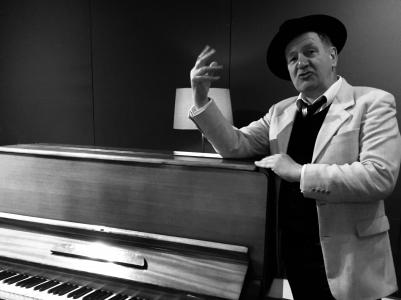
Let’s be clear: Frank Sinistra is not a nice man. As a person he seems to have no saving graces; you would not want him to be your friend. But hope he is not your enemy. To him it makes no odds: friend or enemy, if there is money to be made out of you he’ll take it.
Sinistra is a journalist: if by that you mean he writes for national newspapers. He writes stories that may be true, but who cares? Preferably about ‘celebrities’ and lives that are messy. His only angle is that he needs the story first because that’s where the money is - and it is all about the money.
Sinistra probably never had a moral compass: if he did he traded it for brandy, cocaine or sex. He lacks compassion, his jokes are spiteful and hurtful. He doesn’t care - literally. It’s all about him.
But he is human like the rest of us and we can see his weaknesses, his frailties. He would not care for us but can we care anything about someone as undeserving as him? The concluding songs - Light in your Window and a reprise of the opening Every Soul is like a Circus - have a tenderness and pathos about them that Sinistra does not deserve, but can we be, should we be, more generous than him?
In his new song cycle Pieter Egriega has given us his best creation yet - unpleasant as it may be. He presents us with the worst of any of us and offers no remedies. It is for us to face up to who we are.
The songs are consistently strong and memorable and Egriega is in fine voice: Charles Ormrod provides brilliant piano accompaniment. At times the linking narrative is a bit flabby; it needs to be current and up-to-date but it also needs sharper direction to maintain the energy and dramatic impact. This is another fine show from Pieter Egriega. You will laugh, you will wince and you might even feel sorry for someone so bitter and nasty as Frank Sinistra.
Further performances 20 & 21 July
Keith Savage
ACAPPELLA AND CAKE - Ordsall Acappella Singers
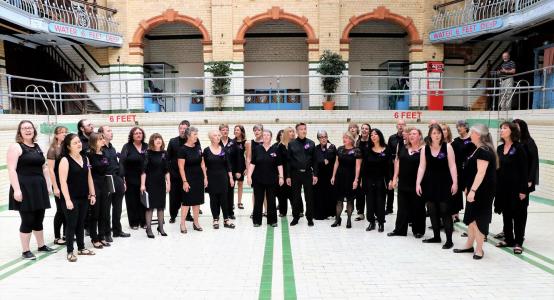
If I’m honest – that’s really honest, I picked this performance because of the promise of cake! I had no real experience of accapella and certainly not a live performance, but following the enthusiastic audience into the venue, I began to feel that I’d made the right decision to come along.
The choir, the Ordsall Accapella Singers harks from Salford and have a real mix of members. I estimate there were thirty plus singers’ present. They launched straight into their first set with a stirring rendition of, ‘Bridge over Troubled Water’, with a wonderful soloist picked out as a counterpoint to their soaring vocal capabilities. What struck me immediately, apart from how impressive they sounded, was how much the singers were enjoying themselves – that was more than evident. We were treated next to, ‘I know him so well’, from the musical, Chess – again first rate.
The enthusiastic and engaging, musical director, Jeff Borradaile then introduced the choir and gave the audience a small flavour of what was to come, including a lovely moment of physical comedy before the next track, ‘I say a little prayer’.
There was something to suit everyone’s tastes in the programme – from a touching rendition of, ‘Somewhere over the Rainbow’, to a song called, ‘In Remembrance’, marking this year’s centenary of the end of the First World War. Other numbers included Chris Martin’s, ‘Fix Me’, and a version of, ‘Sway’, which built in intensity and tempo.
In total, the choir sang 14 songs including their finale. It is no exaggeration to say that I could have sat there and happily listened to it all over again, as I think could the audience members sat around me who evidently shared my enjoyment. Following the performance, the audience were invited to join the singers for some home-made refreshments. This visit marks the choir’s eighth appearance at Buxton Festival Fringe and I can only recommend that if they come again you get yourself a ticket. I left with a spring in my step and a smile on my face and that as they say was the real cherry on the cake.
April Irwin
EDEN WALKER PIANO RECITAL - Eden Walker
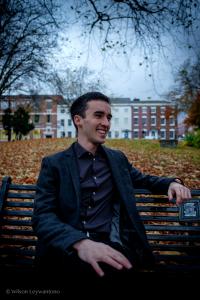
Eden Walker is a pianist with immense dedication to the study of the piano, at the age of 22 so far pursuing a distinguished musical education, receiving pearls of wisdom from numerous piano luminaries of the time. His autobiography mentions growing up in the ‘rural backlands of South Derbyshire’ and forsaking peasantry for the dizzy heights of the Royal Birmingham Conservatoire, a course which included a semester studying in Leipzig. Next month Eden sets sail for Copenhagen to tackle a master’s degree. I expect the celebrities at whose masterclasses Eden has performed would be able to dredge one or two flaws in fluency in the really awkward parts of tonight’s ambitious programme - but the luminaries would have to say something to justify their self serving superior status. However tonight’s performance left the small but appreciative Buxton audience in little doubt that Eden is operating at a very high standard on the instrument.
A man of few words, actually no words, we were provided with an excellent, well presented booklet outlining the background to tonight’s programme containing detailed information of the pieces and contextural information about the composers. With such a comprehensive document to hand, one may be expected conclude there was actually no need for Eden engage in any oral dialogue with the audience. Neither did we get an opportunity to have a glimpse of the maestro or shake his hand in admiration after the concert. Perhaps unintentioned, aloofness could be a sign of aspiring greatness in an artiste en route to the stratosphere of the profession, where communication with the audience is managed by someone else. He apparently enjoys studying the German and Russian languages. Eden’s comfort zone, apart from the evident truly virtuosic music making, would seem to rest in the written word. Indeed Eden himself promotes his professional programme note writing expertise on his website, sections of which are printed in tonight’s programme.
Tonight’s recital on the Methodists’ Church’s Yamaha was a wide ranging selection of classical and romantic piano music, nicely balanced and far from easy to play, demonstrating that Eden’s does not shirk challenging repertoire. The resulting concert was approaching brilliance.
Starting perhaps tentatively he quickly got a grip on one of Beethoven’s later sonatas, Opus 110 in A flat. The piece comprises a variety of stylistic contrasts maybe reflecting the composer’s erratic temperament in his later years, from light singing passages with quotes from folk songs of the day to stern and melancholy sections winding up with the famous fugue theme. Eden’s interpretation of the sonata had all the ingredients of a convincing rendition.
Chopin’s Scherzo in C# minor. Opus 39 is a piece representing a microcosm of Eden’s whole programme with a bit of everything. Following this with three of the Opus 25 Etudes completes the exercise. Studies, implied in the name, intentionally comprise material to exercise the most tricky technical snags in the pianist’s tool box. The Op25, no 6 is full of fiendish runs the execution of which should appeal to the most obsessive and No 11 sometimes called ‘Winter wind’ features a series of complex cascades with barely time to draw breath. A few composers’ study books are also so melodic that the works have adopted a free-standing life as virtuosic concert pieces and Chopin’s work is the gold standard in the field. Eden’s brilliant execution of these swinish pieces makes it sound effortless. His smooth execution doubtless belies many hours of intense practice and a generous dose of inspiration; or is it a streak of stubborn obsessiveness?
Scriabin’s 24 preludes, Opus 11, are each all fairly short and present as a collection of improvised interludes that could be heard in a cocktail bar of the day. It maybe that some of the ideas started out in that way, akin to some notable organists in the early days of radio broadcasting having to respond on the hoof to alarming demands of programme discontinuity and coming up with improvised fillers in a live broadcast, which turned out later to have musical life of their own. In Scriabin’s prelude collection there are many echoes of well known tunes, if not nearly direct quotes, such as the ‘funeral march’ in no 16. Luckily copyright was less stringent and US lawyers poorly organised in 1890! Eden’s programme notes provide a great aid navigating the audience through the 24 preludes. Scriabin’s gems are all very listenable and Eden’s formidable technique makes the trickiest pieces flow effortlessly. Scriabin sets a tough task to execute his prestos without falling into a chaotic jumble of notes and Eden is clearly up to the mark.
Eden’s last piece, the Liszt ‘Reminiscences de Norma’, S 394, has everything to showcase the technical skills of the piano virtuoso: intricate runs, expansive passages, jubilant march themes, delicate to melancholic sections and complex dramatic parts. Most of the tunes are based on the ideas in Vincenzo Bellini’s opera ‘Norma’ and to say that Liszt has created a piano arrangement of the score seriously underestimates the magnitude of this piece. Eden kicks straight for goal with a breath-taking tour de force.
Exiting the hall on a high seemed to be the strategy with no trivial cameo encores or small talk to prove ‘I’m not a robot’. In the remaining time, a quick burst of the minute waltz or a tasty Debussy romance would have endeared his appreciative audience; in the event, to rapturous adulation, Eden symbolically disappeared down the steps retreating to his place on the artistic high ground?
Tonight’s performance of these most challenging works nails Eden Walker’s pianistic skills to the mast of a superb technician.
Brian K W Lightowler
CLOSE ENOUGH AT THE CHESHIRE CHEESE - Close Enough
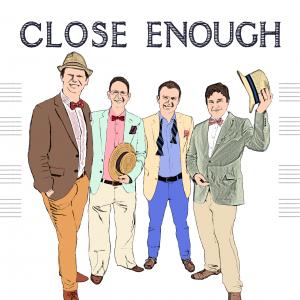
The wonderful Close Enough (Johnny, Tom, Woody and the one in the red trousers) were kind enough to bring their barbershop harmonies back to the Buxton Fringe for a free show at the Cheshire Cheese.
They opened strongly with Mr Sandman followed by My Evelyn and then launched into a Czech folk song with a rousing chorus. The remainder of the first half consisted of Strolling Through the Park, the Story of the Rose, Margie and finished with Goodnight Ladies.
The enthusiastic audience was pleased to see them back for the second half. They covered Lydia and a fabulous version of Hello Dolly followed by Glockamara and Gathering Up the Roses. The audience then all stood while they harmonised God Save the Queen in honour of Gareth and the lads playing the quarter final in Russia the next day. The rest of the set consisted of Goodbye My Coney Island, Loch Lomond and the encore Goodnight Sweetheart.
Loch Lomond was sung in preparation for their imminent tour of Scottish distilleries. This show was over much too soon and the Scottish connection made me hanker to hear their version of one of my my favourites "Wild Mountain Thyme". Maybe next time. Au Revoir Close Enough. Come back soon.
Alex Watts
EARLY MUSIC CONCERTS - Partita
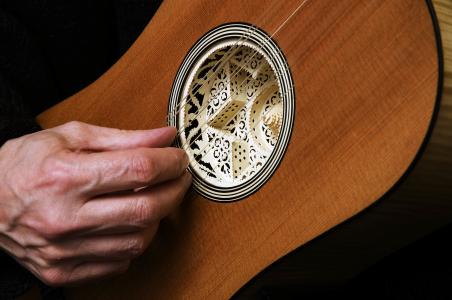
About sixty people attended this concert of mediaeval, renaissance and baroque music played with a large variety of period instruments. The warm, beautiful weather on this afternoon was appropriate for this concert for much of the music was French and Italian. The Partita consists of five instrumentalists two of whom were also singers. They are well established outstanding musicians and have been performing at the Buxton Fringe for a long time.
Throughout the concert instrumental music was played side by side with songs either solo or duet. The songs were accompanied by several instruments in various combinations. The use of the instruments was very effective. For example, in the heart rending Scottish traditional song ‘Remember me my deir ‘the accompaniment begins with a thin texture of lute accompaniment with other instruments added as the music intensifies.
There was much emotion in other pieces as well. In ‘Bella Porta di Rubini ‘the singer compares the beloved with jewels and wishes for silence as kisses have greater communication value than words.
There was some impressive solo playing on the baroque guitar of the Chaconne by Robert de Visee and the harp played a beautiful arrangement of a Scottish traditional folk song. Throughout, the harpist and harpsichordist played the accompaniment and short solo sections with great skill.
A very interesting feature was music played on the kora by Holly Marland. She played two sets of pieces. In the first set she was inspired by the Isle of Eigg in the Hebrides where she had been on a sabbatical. She played a number of her own pieces which could perhaps be described as incantations related to various aspects of the island. The last one was in the style of a Scottish dance celebrating a wedding. She talked about the kora and her time in West Africa which has influenced her own music.
Among the many impressive features were the vocal duets. I really loved their work on an excerpt from Couperin’s Lecon de Tenebre expressing Jeremiah lamenting the destruction of Jerusalem by the Babylonians.
I imagined the players in period dress as they transcended time.
We were lucky to have Sarah Lucas as a narrator who gave useful information about the pieces.
I bought one of their CDs which I would recommend having already listened to it twice through.
I would also recommend attending their other concert on Wednesday 18 July at the Methodist Church.
by Roger Horvath
LIVE MUSIC AT THE BUXTON TAP HOUSE - The Buxton Tap House

When I decided to see a night of live music at my favourite bar, the Buxton Tap House, I knew it would have a lovely atmosphere and ambience and would generally be a great night! Acoustic vocalist, singer song writer, Timothy Hoad brought a refreshing New Age folk take on a variety of brilliant songs such as Cliff Richard's Summer Holiday, Guns and Roses' Sweet Child of Mine and Wreckless Eric's The Whole Wide World. Standing in the corner of the room underneath a string of fairy lights, Timothy played an electro acoustic guitar with the use of a vocal harmony pedal and reverb sound. As the night went on, playing from 9pm - tea lights were placed on each table. Timothy adapted his songs to suit the intimate atmosphere and played songs from his set list to tie in with what the audience seemed to enjoy!
During the 15 minute break, I was lucky enough to speak to Timothy about his musical inspirations, including Enya and Michael Jackson. He told me how happy he was to have the opportunity to play once again in the beautifully atmospheric Tap House and be part of the Fringe Festival. Having taken inspiration from Ed Sheeran with the vocal harmony pedal and played a daringly authentic version of Castle on the Hill, Timothy is soon to release a debut three track EP. He performed each song from this including The Light, written for his mum. Timothy perfectly rounded off the evening with his 'sing-along finale' Wonderwall - performed using his pedal and with harmonies from himself, backed by the audience, something that went down very well.
Live music nights at the Tap House continue to Friday the 20th of July with a variety of different singer songwriters- and if they are anything like the standard of Timothy Hoad I would highly recommend them as a great night in the beautiful Buxton Tap house where you can also enjoy a gin and tonic!
Alice Featherstone
POOLE INCARNATE - The Will Hawthorne Band
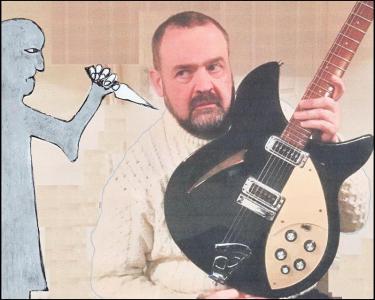
The Buxton International Festival is recognised as a place where rarely performed opera gets a hearing. The Festival Fringe goes one better this year with a world premiere - and with just two more performances lined up don’t hang around.
Will Hawthorne is a regular on the Buxton music scene and whilst he often includes original material this is the first time that I have heard a whole programme of his own work. Poole Incarnate is a mixture of songs alternating with a drama comprised of pre-recorded “telephone calls” that brings together two stories. One historic and one contemporary.
Many of us supposed that the brigand who hid out in the Buxton cave that now bears his name was Robert Poole. A violent criminal and a murderer, recent research suggests that he was in fact Arthur Poole and that he kidnapped a widow around 1350 who then fell in love with him.
In Will’s telling of the story a modern day researcher, James, is completing a PhD on the life of Poole. At the same time his girlfriend Diane is working in Australia.
If you want to know more about the stories of Poole, James and Diane - and how they are related and resolved - you had better see the show which is skillfully presented storytelling. Will plays a mixture of Hank Marvin and Mark Knopfler licks, well supported by the muscular bass of Nik Holmes and a sympathetic rhythm section of Matthew Whittaker (guitar) and Eric Culbert (drums).
The “telephone calls” are voiced by Paul Cromford, Joanna Findlay, Susie Hawthorne, Sarah-May Matthews, Sid Richards, George Telfer and Will. Nik Holmes managed the sound whilst playing bass. The premiere seemed to go without a hitch and the packed Cafe audience enjoyed what was a fun piece - suitably “operatic” in that the story requires some imaginative leaps but things are tidily resolved. The songs and music are easy on the ear and you might look at the Cavern in a different way on your next visit.
Proceeds from the Poole’s Cavern shows are going to Music in Hospitals & Care. Everyone is a winner
Further performance on July 10th and at Buxton Working Men’s Club on July 17th
Keith Savage



